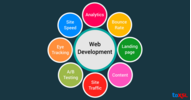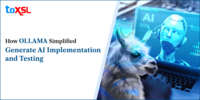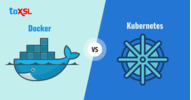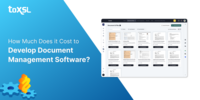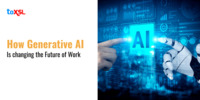- Sep 19, 2025
- Others
- 3098
Share this post on:
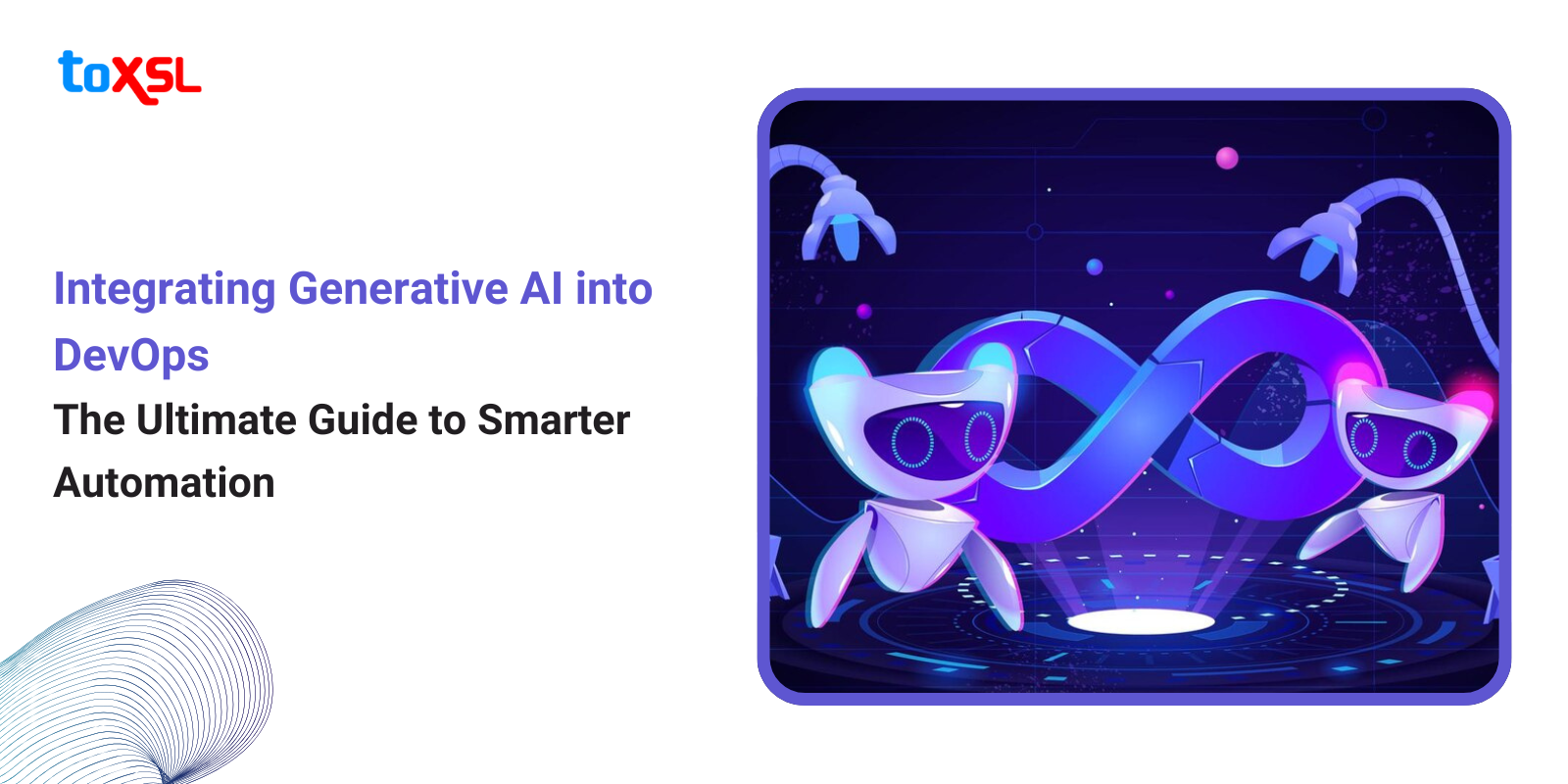
In DevOps, being fast and efficient is key. The main goal is to automate the process of making, testing, and releasing software with less human help. Generative AI can help with this. It makes workflows better, handles tasks that are repeated over and over, and helps get software out faster. This guide shows how to use Generative AI in DevOps to make automation smarter, make better decisions, and work better overall.
Key Takeaways
- Generative AI automates repetitive DevOps tasks, improving speed and accuracy.
- It enhances decision-making through data insights and predictive analytics.
- Helps optimize CI/CD pipelines, testing, and incident management.
- Boosts code quality, system reliability, and reduces time-to-market.
- Best results come from starting small, using quality data, and continuous improvement.
What is DevOps?
DevOps is a way of working that brings together two groups: the people who create software and the people who manage computers. It helps them work together better and get more done. DevOps uses automation to make tasks easier. It also means checking and sending out software regularly and testing it all the time. This helps make software development faster and better by removing barriers between different teams. The core goals of DevOps include:
- Automation: Automating repetitive tasks such as building, testing, and deploying code.
- Collaboration: Enhancing communication and collaboration between development and operations teams.
- Continuous Improvement: Continuously monitoring and improving the software development lifecycle.
What is Generative AI?
Generative AI is a type of artificial intelligence that can create new things like text, pictures, sounds, or code. It uses what it knows to make new content. Unlike other AI systems that just find patterns, Generative AI makes new things. A popular type is GPT, which is trained on a lot of data and can write like a human or create images. In DevOps, Generative AI helps by doing routine tasks, suggesting improvements, writing code, and even predicting system failures.
How Generative AI Enhances DevOps
Integrating Generative AI into DevOps can have a transformative impact on your software development lifecycle. Here’s how:
Automating Repetitive Tasks: Generative AI can manage loads of the boring, repetitive responsibilities in DevOps. It can assist create primary code for things that are doneover and over, write scripts to get the software up and running, or maybe make assessments that run automatically.This frees up time for greater interesting and important work.
Enhancing Decision-Making: Generative AI can go through a lot of past data and logs to find important clues that might be overlooked. It can help determine where things might get stuck, suggest methods to improve the system setup, and offer ideas to boost performance.
Continuous Integration and Delivery (CI/CD): Generative AI can improve your CI/CD pipelines by predicting when builds might go wrong and finding areas where testing isn't thorough enough. It can also assist figure out the best way to deploy software in different environments, which reduces errors and continues systems running smoothly.
Improved Monitoring and Incident Response: Generative AI can watch the system in real-time, catching any unusual activity or potential problems before they become problems. It can automatically make reviews when something goes wrong and propose answers based on past reports and professional advice.
Benefits of Integrating Generative AI into DevOps
Integrating Generative AI into DevOps brings numerous benefits, including:
Increased Efficiency: Generative AI automates routine tasks like developing code or deploying software. This lets developers concentrate on more essential work. By doing much less manual work, teams can make their workflows faster and accelerate software development.
Faster Time-to-Market: AI automation makes the development, testing, and deployment levels quicker. This way software can be launched quicker, and teams can reply more quickly to what customers want.
Enhanced Code Quality: Generative AI allows discover potential issues in code earlier than they become issues. This guarantees that the code is of better quality with fewer bugs.
Predictive Analytics: Generative AI excels at identifying patterns in data. In the context of DevOps, it can offer predictive insights to assist prevent incidents, optimize resource allocation, and enhance system reliability.
Cost Reduction: Generative AI is good at finding patterns in data. DevOps, can provide insights to assistprevent problems, optimizeuseful resource use, and make systems more reliable.
Key Use Cases of Generative AI in DevOps
Here are the few use cases of Gen AI in DevOps:
Code Generation Generative: AI is transforming how developers work. It can analyze existing code and automatically create new code, giving helpful suggestions or even building new features. This saves developers a lot of time, boosts productivity, and reduces mistakes. For example, tools like GitHub Copilotcan suggest pieces of code, complete functions, or write entire sections based on a short description. This makes coding easier and ensures that all team members consistently write code.
Automated Testing: Generative AI allows create test cases for software through looking at the code or past issues. It makes certain all possible situations are tested, lowering the risk of bugs after deployment. Tools like Test.ai can simulate how customers engage with software, expect in which mistakes might happen, and improve testing efficiency through mastering from past tests.
CI/CD Pipeline Optimization: Generative AI helps make the CI/CD process run more smoothly. It finds where things are slowing down, predicts when builds might fail, and suggests better ways to use resources. For example, AI tools can look at past build data to predict problems and alert developers early. This helps ensure that software is delivered without any major issues.
Infrastructure as Code (IaC): Generative AI makes setting up infrastructure easier. It automatically creates code to set up servers, databases, and other components. It can also find mistakes in how things are set up or if resources are being wasted and suggest improvements.
Incident Management and Automation: AI can automate finding and fixing system issues. It looks at logs and performance data to predict problems before they happen, creates reports, and recommends solutions based on past incidents and best practices. For organizations looking for even more efficiency, exploring Pagerduty Alternatives that bring 10x Value can help streamline incident management and maximize the benefits of AI-driven automation.
Also Read:Docker Vs. Kubernetes: A Comprehensive Guide to Containerization Tools
Steps for Integrating Generative AI into DevOps
Identify the Areas for AI Integration: Begin by finding the parts of your DevOps process where AI can help. Focus on tasks that are repeated often, take a lot of time, or are likely to have mistakes, such as creating code, testing, and handling incidents.
Select the Right Tools and Platforms: Pick the right AI tools based on what you need. For example, if you want help creating code, tools like GitHub Copilot or Tabnine are great options. If you're looking for automated testing, try tools like Test.ai or Selenium with AI features. These tools can save time and make your work easier.
Train AI Models: To get the best results, you might need to adjust the AI models using your data.This means training the model with your code, past deployment data, or incident reports. This helps the AI give you insights that are relevant to your specific situation.
Integrate AI into Your CI/CD Pipeline: Add the AI tools you've chosen to your CI/CD pipeline. This could mean using AI to automatically check code, create test cases, or make your build and deployment process more efficient.
Monitor and Iterate: After adding AI to your DevOps processes, keep watching how it performs. Track things like build times, test coverage, and how quickly incidents are resolved.Use this information to make adjustments and improve how well AI automation is working.
Challenges of AI Integration in DevOps
While integrating Generative AI into DevOps offers numerous advantages, it also comes with some challenges:
Data Privacy and Security: AI models need a lot of data to work well. This can be a problem when dealing with sensitive information, as it raises concerns about keeping data safe and private.
Integration Challenges: Adding AI to your DevOps processes can be tricky. It requires careful planning and might need big changes to your systems, tools, and workflows.
Skill Gaps: Not all DevOps teams have the right skills to handle AI and machine learning. You might need to train your team or hire experts to manage AI automation effectively.
Best Practices for Leveraging Generative AI in DevOps
To get the best results from Generative AI in your DevOps processes, try these tips:
Start Small: Begin by using AI in just one or two areas, like creating code or automated testing.
Use Good Data: AI works best with clean, accurate, and relevant data. Make sure your training data is high quality.
Check Progress: Regularly track how well AI tools are working to ensure they're making a positive impact.
Stay Updated: AI and DevOps technologies are always changing. Keep learning about new tools and best practices to stay ahead.
The Future of Generative AI and DevOps
As AI gets better, using Generative AI in DevOps will become even more powerful. In the future, we can expect AI models to handle even more complicated tasks, like fixing problems in real-time and making systems fix themselves.This will make DevOps processes more independent, allowing teams to focus on bigger strategies and new ideas.
Conclusion
Adding Generative AI to DevOps is a great chance for teams to improve automation, make better decisions, and release software faster. AI can help with tasks like writing code, testing, and making workflows more efficient. This can make companies more productive, reduce errors, and make their processes smoother. Although there are some challenges, the long-term advantages of using AI in DevOps are clear. Teams that use this technology will be well-prepared for success in the future. By using Generative AI in your DevOps practices, you'renot only making your automation better today, but you're also getting your software development ready for future challenges. ToXSL Technologies is a leading Generative AI services offer in the best AI solutions to the businesses worldwide. Contact us today.
FAQ's
1. What is Generative AI in DevOps?
Generative AI in DevOps means using smart AI tools that can create code, write scripts, or suggest solutions automatically. It helps DevOps teams speed up tasks like writing configuration files, generating test cases, or fixing bugs, making the whole development and operations process smoother and faster.
2. How can Generative AI improve DevOps automation?
Generative AI makes DevOps automation smarter by reducing manual work. It can automatically generate scripts, analyze logs, suggest solutions for errors, and even create CI/CD pipelines. This saves time, reduces human error, and helps teams deliver software faster and more efficiently.
3. Is it safe to use Generative AI in DevOps?
Yes, it's safe if used carefully. You should always review the code or suggestions generated by AI before using them. It’s important to set up proper security rules and keep AI tools updated. When used wisely, Generative AI can be a powerful and safe tool for DevOps.
4. Do I need to be an AI expert to use Generative AI in DevOps?
No, you don’t need to be an AI expert. Many tools are user-friendly and made for developers or DevOps teams with basic knowledge. These tools often come with helpful guides, and you can start small—like using AI to generate scripts or help with testing—and grow from there.





